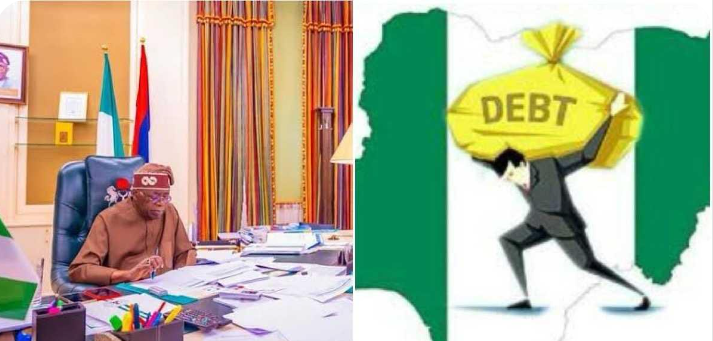
“Borrowing Isn’t a Sin”: Presidency Defends Nigeria’s Debt Strategy Amid Economic Reforms

In a bold and unapologetic declaration, the Nigerian Presidency has stated that borrowing is not a moral or economic misstep but rather a critical instrument for national development. As President Bola Tinubu seeks legislative approval for a staggering N34.15 trillion in new loans, his administration is doubling down on its economic strategy, asserting that debt, when properly managed, can be a catalyst for transformative growth rather than a burden.
At a press briefing in Lagos, the Special Adviser to the President on Information and Strategy, Mr. Bayo Onanuga, took center stage to confront growing public concern over Nigeria’s escalating debt profile. Speaking to a room of skeptical reporters and economic analysts, Onanuga didn’t mince words. “It is not a sin to borrow,” he declared. “Even developed nations like the United States and the United Kingdom borrow beyond their GDP. The issue is not borrowing; it’s what you do with the borrowed funds.”
The statement comes at a time when Nigeria is grappling with a challenging economic landscape—characterized by high inflation, currency volatility, and fiscal strain. Yet, according to the presidency, the situation is not as bleak as critics paint it. Onanuga argued that the country's budget is relatively small compared to other African economies like South Africa, despite its large and growing population. This mismatch, he said, necessitates strategic borrowing to fund infrastructure, social services, and developmental projects that would otherwise remain on paper.
“We are a poor country with a large population. We must stop deceiving ourselves; Nigeria’s budget is smaller than South Africa’s. We have to be realistic about what we can fund without borrowing,” Onanuga stated candidly.
He acknowledged the turbulence experienced during the administration’s first year, citing inflation, a volatile forex market, and inherited structural problems as significant hurdles. But there has been a noticeable turnaround, he asserted. Nigeria’s macroeconomic indicators are now pointing in the right direction, with endorsements from major international financial institutions such as the World Bank and the International Monetary Fund. According to Onanuga, these organizations have publicly recognized the government's economic reforms and renewed policy discipline.
One of the most striking data points revealed during the briefing was the performance of Nigeria’s stock market. “Nigeria’s All Share Index has more than doubled from 50,000 in 2023 to over 110,000 in 2025,” Onanuga said. “The country’s foreign reserves now stand at $21 billion, up significantly from previous lows.” These numbers, he added, are not mere statistical anomalies but clear signs that investor confidence is returning and that the economy is stabilizing.
Furthermore, the government has made tangible progress in reducing its debt servicing burden—a critical metric often used to judge fiscal health. According to Onanuga, debt servicing has dropped from a concerning 97 percent of government revenue to under 60 percent. This reduction, he argued, has created fiscal space that can be redirected towards essential sectors such as healthcare, education, and social safety nets.
The administration also spotlighted several ongoing initiatives aimed at addressing both the long-term structural deficits and the immediate economic pain being felt by ordinary Nigerians. These include a combination of public-private partnerships and innovative financing models that are being deployed to support projects in transportation, housing, and vocational education.
“We are laying the groundwork for Nigeria’s industrial base through technical education and access to finance,” Onanuga said. He revealed that over 600,000 students have already benefited from the government’s student loan scheme under the Nigerian Education Loan Fund (NELFUND).
As inflation continues to squeeze household budgets and the cost of living remains high, Onanuga emphasized the government’s commitment to alleviating economic hardship. He listed a slew of targeted interventions, from the bulk purchase of essential medicines under the medical pool initiative to direct agricultural support designed to stabilize food prices.
A major highlight of these interventions is the promotion of Compressed Natural Gas (CNG) as an alternative to petrol. “Today, some ride-hailing drivers who used to make N10,000 weekly now earn that daily, just from fuel savings,” Onanuga noted, offering a real-world example of how policy changes are filtering down to everyday Nigerians.
Another headline policy revealed was a temporary suspension of rice import duties, which the government hopes will disrupt hoarding practices and make staple food more affordable. “Also, the President approved a six-month waiver on rice importation. That move was deliberate to crash food prices and break the cycle of hoarding and artificial scarcity,” Onanuga said.
Joining the chorus of support for the administration’s borrowing strategy was Special Adviser on Public Communication, Mr. Sunday Dare. He underscored the importance of loans in delivering large-scale infrastructure projects that fuel regional economies. “We can’t build highways from Lagos to Calabar or Sokoto to Bida without borrowing. Projects like these wake up entire regions economically. The real problem isn’t debt—it’s waste. With proper utilization, borrowing is a tool for national transformation,” Dare insisted.
Both officials concluded their address with a call for realism and national self-reflection. They urged Nigerians to recalibrate their expectations, accept the country’s financial limitations, and support the difficult choices being made today for a more stable tomorrow.
“We need to be honest with ourselves,” Onanuga said in closing. “Nigeria is not as rich as many people think. We are a large country with limited resources and a rapidly growing population. The truth is, we must recalibrate our expectations and manage our ambitions more realistically.”
With the nation watching closely and the legislature now deliberating over the massive loan request, the coming weeks may determine whether the Presidency’s defense of borrowing as a necessary tool gains broader public and political acceptance—or faces a wave of resistance fueled by economic fatigue and skepticism.


